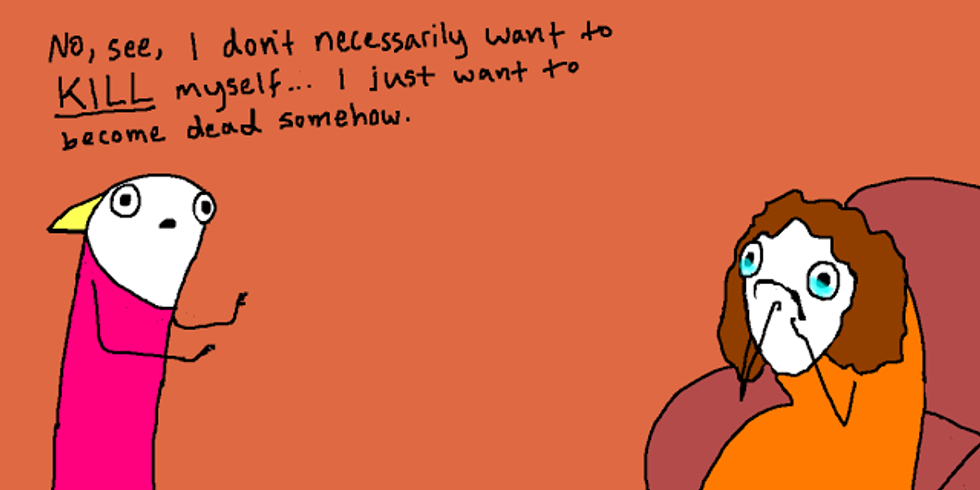There has been a recent trend in the media to raise awareness of the fact that those who struggle with mental health issues often do a phenomenal job of hiding them from even their closest friends. Additionally, this awareness raising makes it clear that many people experience mental illness differently, exhibit different symptoms and seek out different styles of treatment. This trend has made great strides towards removing the stigma of mental illness, allowing for individuals struggling with mental illness to feel comfortable enough to reach out and ask for help. However, reaching out and asking for help is still as awkward as ever.
In my own experience with depression, I've spent a lot of time dealing with thoughts of suicide. I've largely grown accustomed to these thoughts and have learned how to brush them to the side, such that the amount time I devote to thinking about death seems like a casual part of my life. I've come to realize that the average person doesn't recognize thoughts of suicide as something casual at all.
When I talk about my own thoughts of suicide, people tend to quickly become nervous because it seems like something that requires immediate attention to prevent, which in some cases is certainly true. However, individuals struggling with depression can also find themselves in the weird, in-between place of being low key suicidal: a position that acknowledges proximity to the ledge, but shows no clear intention of taking any more steps towards it.
How is this possible? I would explain it like this:
Do I think the world would be a better place without me? Yes.
Do I wish I were dead? Yes.
Do I want to kill myself? Sometimes.
Am I going to kill myself? No.
I'm at a point in my journey with depression where I acknowledge all of these thought processes as entirely destructive to my mental well-being and am working towards breaking them down, but until then, they're a part of my life I don't talk about because it generally freaks everyone out.
Because people have a hard time wrapping their minds around thoughts of suicide as being a casual thing that sometimes comes along with other symptoms of depression, it can be easy to feel misunderstood when reaching out for help. That is a feeling I know all too well, but have been able to find a handful of works of fiction that phenomenally discuss the issue of being casually suicidal: the blog Hyperbole and a Half's posts "Adventures in Depression" and "Depression Part Two" (whose images I have featured in this article), Ned Vizzini's novel It's Kind of a Funny Story which follows a teenager who checks himself into a mental hospital, and the film Harold and Maude which follows a young man who repeatedly stages his own death.
I get it, suicide can be a scary thing to talk about because it represents a tragic and preventable end to far too many lives. However, if we are all too scared to talk about it, the stigma attached with mental illness will never truly be erased. Once we can truly acknowledge mental illness as a normal health issue that countless people encounter in their lifetimes and treat it as such, these conversations can stop being so incredibly awkward and those who need the help may find themselves more comfortable reaching out for it.
If you find yourself struggling with depression and/or thoughts of suicide, here are some resources that can help:
National Suicide Prevention Lifeline: 1 (800) 273-8255
Colgate's Counseling Center Crisis Hotline: (315) 228-7333 or make an appointment online.
Colgate's Shaw Wellness Center: (315) 228-6076

























